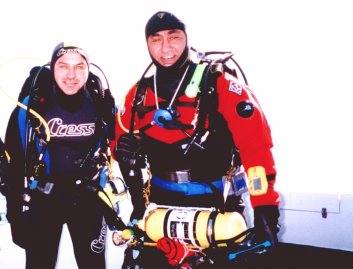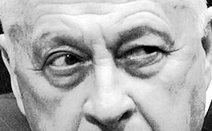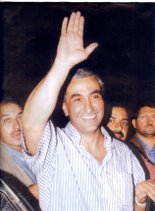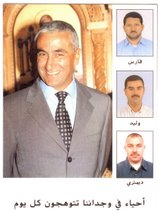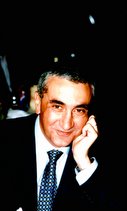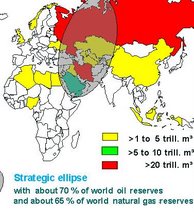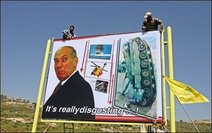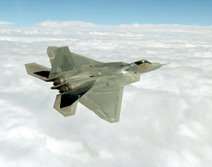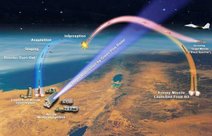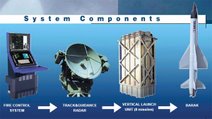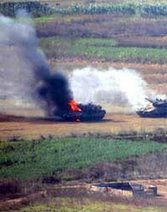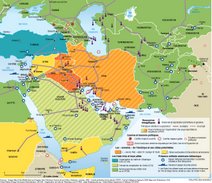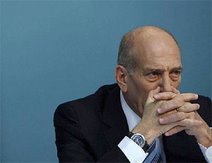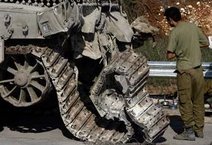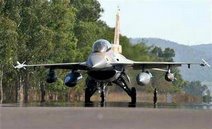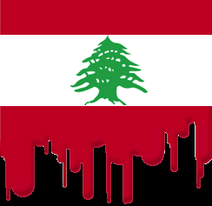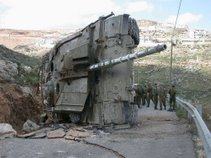
Global security and NATO Brazen propaganda
With the demise of Communism, reasons for the West and Russia to be in confrontation vanished. Russia entered on the path of European democracy.
In many areas, cooperation between Russia and NATO has yielded positive results. This is true in Russia's support for the transit of cargo by the International Security Assistance Force in Afghanistan. We are also gaining momentum in civil emergency planning, and our scientists are successfully collaborating on equipment to fight terrorism.
Such successes, however, are largely overshadowed by contradictions in another issue - NATO enlargement and the admission of Ukraine and Georgia into the alliance. As the official representative of Russia to NATO I have to deal with what NATO representatives give as arguments, which are in fact fusty propaganda rhetoric of the Cold War. These dogmas threaten both progress in Russia-NATO relations and the prospects for global security, and even the process of cementing democracy in Russia.
Dogma No. 1: NATO is a union of democratic states, and democratic states do not fight other democracies.
This is totally meaningless. NATO is not a union of democracies; it is a union of militaries. When the NATO secretary general criticizes parliamentary elections in my country, he oversteps his mandate. Combining his evaluation of Russian democracy with the thesis that NATO does not fight democracies - and conversely does fight non-democracies - his words could be interpreted as a threat to Russia.
The second dogma - "Russia and NATO are not enemies but partners" - resonates with irrelevance.
The final document of the NATO summit in Bucharest in April promises that Ukraine and Georgia will become members of NATO. This is an obvious affront to any vision of a partnership or democracy.
Neither Georgia nor Ukraine have full domestic support for the accession of their countries to NATO. In Georgia, residents of Abkhazia and South Ossetia did not take part in the referendum on the accession to NATO. And as far as Ukraine is concerned, only a fifth of its population, concentrated mainly in Western provinces, embraces the idea of joining NATO. Despite that, the "alliance of democracies" is trying to drag the rest of the country into its barracks, establishing new lines of division not only within Europe but between nations that have more than a thousand years of common history.
Dogma No. 3: Countries that joined NATO have improved their relations with Russia.
The reality is the opposite. Once they get hold of a club card, NATO neophytes press for globalizing their relations with Russia. When Poland entered European structures, it drew its new partners into its "meat war" with Russia. This scandalous marketing was unsuccessful and had no impact on Russia-EU relations, but it did attract a good deal of attention.
Estonia, obviously counting on the protection of NATO partners, blasphemously ravaged a communal grave of soldiers who died liberating Tallinn from Nazis and dismantled a monument to soldiers who fought fascism. Lack of a definite stand among Western countries was sobering even for the most pro-Western of politicians in Russia.
Dogma No. 4 also resembles propaganda: NATO pursues an "open-door policy."
Russia cannot enter these doors - unlike, for example, Albania or Croatia. That means the enlargement of NATO diminishes the political weight of old European democracies in favor of the United States and to the prejudice of a security environment in Europe that could address real threats.
On the issue of the American plans to deploy elements of strategic missile defense in Poland and the Czech Republic: We are reassured again and again: "Russia is not our enemy"; "The missile defense is an umbrella to protect us against bad guys from Iran who threaten the good guys in America and Israel."
In fact, nothing consolidates and compromises opposition better than an outside enemy. As one who lived a significant part of his life under the Soviet regime, let me tell you that if it had not been for the Cold War, democratization would have begun in the USSR decades earlier.
Secondly, plans to intercept Iranian missiles over the Czech Republic and Poland is a joke. Even if we assume Iran is ready to produce these missiles, wouldn't it be more logical to deploy defenses in Turkey, Bulgaria or Iraq? Yet Washington persists in reiterating its arguments, which gives us grounds to believe we are not being told the whole truth.
Then there are the references to the famous Munich speech made by President Vladimir Putin and other claims that Russia is getting more aggressive.
What, did Putin reveal some dark secret? The secret that NATO is enlarging, opening new military bases and establishing division lines in Europe? Is it a secret that NATO has been challenging the UN and ignoring international law?
It's just that Putin said these things in an open and honest manner, as befits a leader meeting with foreign colleagues, urging them to share his concern.
We also have a hard time understanding what drives the USA in partitioning Serbia and creating a criminal state under the de-facto control of a drug mafia. According to UN experts, Kosovo smuggles up to 75 percent of the heroin consumed in Europe.
So where is the alleged Russian aggressiveness? Is it in trying to convince partners not to make fatal errors? Is it that we state openly that the "deterrence of Russia" concept is senseless, and that the enlargement of NATO does not solve the problems of European security but on the contrary creates an illusion of security, rendering Europe vulnerable to new threats, such as terrorism, religious extremism and illegal migration?
New threats necessitate a new vision of the Russia-NATO partnership, which President Dmitry Medvedev has defined as the "unity of the whole Euro-Atlantic space, from Vancouver to Vladivostok."
Russia's relations with NATO constitute the basis of global security. Today this is the only prerequisite for the development of our relations. Both Russia and Europe have a common past, common values and common culture. Our future too will be common if we fill it with the spirit of trust and true partnership.
As for the propaganda skeletons, they should be stacked in the closet of the Cold War. Dmitry Rogozin is Russia's ambassador to NATO.
Unconventional wisdom about Russia...because the USA still eyes a threatening local alliance of IRAN and Russia in the making with a heavy nuclear balance in Russia and one in the making in IRAN, a scenario which is made in HELL and will never materialize in our life time at all on the one hand, but securing OIL and GAZ transportation routes in times of heavy turbulence and troubles worldwide with Peak Energy at hand soon...when and where the USA will not blink to help RUSSIA if its eastern Siberian provinces are overrun by large Chinese military expeditionary forces to compensate for loss of oil and gas access in the Mid-east and elsewhere in Africa, a more realistic scenario not to be ignored by Putin and Medvedev and the Russian military....
Conventional wisdom treated Dmitry Medvedev's inauguration as president of the Russian Federation as a continuation of President Vladimir Putin's two terms of Kremlin dominance and assertive foreign policy.
A visit to Moscow with an opportunity to meet leading personalities of the political world, as well as representatives of various age groups in business and intellectual circles, convinced me that this judgment is oversimplified and premature.
For one thing, the emerging power structure in Moscow seems more complex than conventional wisdom holds. It was always doubtful why, if his primary objective was to retain power, Putin, at the height of a popularity that would have allowed him to amend the Constitution to extend his term, would choose the complicated and uncertain route of becoming prime minister.
My impression is that a new phase of Russian politics is under way. The statement that the president designs foreign and security policy, and the prime minister implements parts of it, has become the mantra of Russian officials from Medvedev and Putin down. I encountered no Russian in or out of government who doubted that some kind of redistribution of power is taking place, although they were uncertain of its outcome.
Putin remains powerful and highly influential. It is likely that he has assigned to himself a watching brief over the performance of his successor; it is possible that he is keeping open the option of becoming a candidate in a future presidential election.
Whatever the ultimate outcome, the presidential election marked a transition from a phase of consolidation to a period of modernization. The growing complexity of the Russian economy has generated the need for predictable legal procedures, as already foreshadowed by Medvedev. The operation of the Russian government with two centers of power - at least initially - may, in retrospect, appear as the beginning of an evolution toward a form of checks and balances lacking heretofore.
What are the implications for American foreign policy?
During the next several months, Russia will be concerned with working out the practical means of the distinction between design and implementation of national security policy. The Bush administration and the presidential campaigns would be wise to give Russia some space to work out these arrangements by restraining public comment.
With respect to the long term, ever since the demise of the Soviet Union in 1991, a succession of American administrations has acted as if the creation of Russian democracy were a principal American task. Speeches denouncing Russian shortcomings and gestures drawn from the Cold War struggle for pre-eminence have occurred frequently.
The policy of assertive intrusion into what Russians consider their own sense of self runs the risk of thwarting both geopolitical as well as moral goals. There are undoubtedly groups and individuals in Russia who look to America for accelerating a democratic evolution. But almost all observers agree that the vast majority of Russians consider America as presumptuous and determined to stunt Russia's recovery. Such an environment is more likely to encourage a nationalist and confrontational response than a democratic evolution.
It would be a pity if this mood persisted because, in many ways, we are witnessing one of the most promising periods in Russian history. Exposure to modern open societies and engagement with them is more prolonged and intense than in any previous period of Russian history - even in the face of unfortunate repressive measures. We can affect it more by patience and historical understanding than by offended disengagement and public exhortations.
This is all the more important because geopolitical realities provide an unusual opportunity for strategic cooperation between the erstwhile Cold War adversaries. Between them, the U.S. and Russia control 90 percent of the world's nuclear weapons. Russia contains the largest landmass of any country, abutting Europe, Asia and the Middle East. Progress toward stability, with respect to nuclear weapons, in the Middle East and in Iran, requires - or is greatly facilitated by - Russian-American cooperation.
Confrontational rhetoric notwithstanding, Russia's leaders are conscious of their strategic limitations. Indeed, I would characterize Russian policy under Putin as driven in a quest for a reliable strategic partner, with America being the preferred choice.
Russian turbulent rhetoric in recent years reflects, in part, frustration by America's seeming imperviousness to that quest. Two elections for the Duma and the president also have given Russian leaders an incentive to appeal to nationalist feelings rampant after a decade of perceived humiliation. These detours do not affect the underlying reality. Three issues dominate the political agenda: security; Iran; and the relation of Russia to its former dependents, especially Ukraine.
Because of their nuclear preponderance, Russia and America have a special obligation to take the lead in global nuclear issues such as nuclear proliferation. Four questions need to be answered in this respect: Do Russia and the U.S. agree on the nature of the challenge posed by the acquisition of nuclear weapons by Iran? Do they agree on the status of the Iranian nuclear program? Do they agree on the diplomacy to avert the danger? Do they agree on what measures to take if whatever diplomacy is finally adopted fails?
It is my impression that a considerable consensus is emerging between the U.S. and Russia regarding the first two questions. With respect to the others, both sides must keep in mind that neither is able to overcome the challenge alone or at least only with greatly increased difficulty.
The issue of relations with Ukraine goes to the heart of both sides' perceptions of the nature of international affairs. Genuine independence for Ukraine is essential for a peaceful international system and must be unambiguously supported by the U.S. But the movement of the Western security system from the Elbe River to the approaches to Moscow brings home Russia's decline in a way bound to generate a Russian emotion that will inhibit the solution of all other issues. It should be kept on the table without forcing the issue to determine the possibilities of making progress on other issues.
The Sochi declaration of Presidents Bush and Putin in April outlined a road map for an emerging strategic dialogue between the two sides. It remains for the new administrations in Russia and America to give it operational context....
-------------------------------------------------------------------------
Russia's energy drive leaves US reeling...
Last week, the gloves finally came off the Dmitry Medvedev presidency in Russia. It had to happen sooner or later, but few would have expected this soon. It was crystal clear US President George W Bush administered a diplomatic snub to Medvedev on the sidelines of the Group of Eight (G-8) summit meeting at Hokkaido, Japan.
Bush characterized him patronizingly as a "sharp guy" soon after they met in Hokkaido on July 9, but that was after making sure Secretary of State Condoleezza Rice proceeded to Prague and signed a deal just the previous day to install a US radar system as part of its missile defense system in Central Europe.
If Medvedev's core mission in Hokkaido was to underscore Russia's growing role in the world arena as a power with which the West has to contend, Bush acted as if he couldn't care. The US was also plainly dismissive of Medvedev's proposal at the G-8 for a pan-European security system that would include Russia. Medvedev expressed his "dismay" on hearing about the Prague deal. As if to rub in the snub, Rice proceeded from Prague to Bulgaria, where the US has for the first time established a military base, and then on to Georgia to discuss its plans of joining the North Atlantic Treaty Organization (NATO).
While in Tbilisi, she called for international mediation to stop violence spilling over in Georgia's beakaway regions of South Ossetia and Abhkazia, which have been sources of rising tensions, with Georgia accusing Russia of trying to annex the regions. To carry matters further, the US began a joint military exercise with Georgia codenamed Immediate Response 2008, near Tbilisi, which will continue through the month of July.
The exercise, financed by the Pentagon and planned by the US Armed Forces Eastern Command, is intended as a warning to Russia that Georgia is America's project and Washington wouldn't hesitate to do some heavy lifting to safeguard the "Rose Revolution".
On the face of it, such hubris is illogical and unnecessary since the West should have every reason not to embarrass Medvedev. The West has been propagating in recent months that the youthful Russian president is a potential independent decision-maker in the Kremlin with whom it could do business - unlike his predecessor, Vladimir Putin.
Reflecting US thinking, Carnegie Moscow Center scholar Dmitri Trenin wrote recently that the West noted "Medvedev's quick-wittedness, his calm style of conducting talks, and his clear desire to show that he is the one who is the real master of Russian diplomacy ... There are much greater grounds for expecting that Dmitry Medvedev ... will slowly but steadily concentrate powers in his own hands."
Clearly, what has been going on for the past few months on the East-West stage is one of those pantomimes that the West and Russia are equally adept at playing. But the US seems to have concluded that all the Western flattery about him hasn't really gone to Medvedev's head and he has merely been demonstrating his own skill in dramatics. Actually, nothing much has changed in Russia. The polls show Putin, now premier, is still seen by Russians as their "supreme leader", with a popularity rating coasting above 70% - with Medvedev stuck at 47% - and the truth might be somewhere near what a Moscow commentator recently sized up, namely, that Medvedev is a co-pilot in the cockpit in which Putin remains the captain.
Besides, Medvedev would know that even if he wished to be the European modernizer and G-8 club member that the West wanted him to be, he would find himself hopelessly at odds with his country. According to a poll last week by a Russian television network, the symbol of renewal of present-day Russia turns out to be none other than Josef Stalin. By a substantial margin, Stalin left behind two colorful Vladimirs - the singer Vladimir Vysotsky and the revolutionary Vladimir Lenin - and a host of other perennial Russian heroes like Ivan the Terrible and Alexander Pushkin.
Indeed, when Medvedev signed last Saturday a new foreign policy strategy for Russia, it came to light that for the first time the prime minister has been put in the driving seat to implement foreign policy measures - hitherto a presidential prerogative - which also shows that the Kremlin will pursue the line set by Putin in his eight-year presidency. The vague and somewhat incomprehensible expectations that there might be of some kind of "liberalization" in Medvedev's foreign policy have proved to be unfounded.
But Moscow hasn't taken lightly the US snub. In an address to Russian envoys in Moscow on Tuesday, Medvedev unambiguously stated his intention to continue Putin's foreign policy course, criticizing the US moves on missile defense deployment, the West's failure to ratify the revised Treaty on Conventional Armed Forces in Europe, Kosovo's independence, etc. He said, "We strongly affirm that the deployment of elements of the global missile defense in Eastern Europe only exacerbates the situation ... we will be forced to respond to it in kind ...
"This is linked to Russian-American agreements on strategic stability. Obviously, this common heritage will not be able to survive if one party is permitted to selectively destroy individual elements of this strategic regime. We cannot agree to that."
According to the noted German expert on Russia, Alexander Rahr, last week's Russian veto on the United Nations Security Council draft resolution on Zimbabwe was also a response to the US move on missile defense. "China's opposition is easy to understand as it has many economic interests in Zimbabwe. Russia has none. Russia's veto is a response to the missile shield, to Abkhazia and to many other things ... Russia is trying to show that America cannot decide everything," Rahr said.
The Russian veto generated a new American theme song that Medvedev isn't calling the shots in the Kremlin and might have got slapped down on Zimbabwe. But Moscow brushed aside the suggestion. The Foreign Ministry issued a statement calling the draft resolution on Zimbabwe "a dangerous precedent ... illegitimate and dangerous, leading towards unbalancing the whole UN system". The statement rebuked Washington and London, saying, "Russia took into account the fact that the situation in Zimbabwe does not pose a threat to regional, let alone international peace and security and does not warrant adoption of sanctions against that country."
Again, on Monday, Moscow announced that for the first time since the breakup of the Soviet Union in 1991, Russian warships were resuming patrol of the Arctic waters. In effect, Medvedev signaled he was maintaining the course of expanded military patrols begun by Putin. Why such a sudden quickening of the tempo in US-Russian relations? The answer might be found on an entirely different plane - energy security.
What emerges is that if anything, Medvedev is pursuing Russia's energy diplomacy more robustly than Putin. Soon after taking over in the Kremlin in May, Medvedev ordered the expeditious completion of the first stage of the Eastern Siberia Pacific Oil Pipeline (ESPO) by end-2009. The ESPO has a vital role in Moscow's efforts to balance its oil export strategy between Europe and Asia-Pacific. Moscow hopes to target Asia-Pacific as the export destination for one-third of its oil exports by 2020, as compared to 3% currently.
In early July, Medvedev undertook a diplomatic tour of the Caspian region, covering Azerbaijan, Turkmenistan and Kazakhstan. In Azerbaijan's capital Baku, he made a stunning offer that Russia was prepared to buy Azerbaijan's entire gas output at market prices. In Ashgabat, he shored up Turkmenistan's commitment to the modernization of the Central Asia-Center Pipeline and the construction of a new littoral Caspian pipeline.
Medvedev succeeded in prevailing over competing European and US rivals in the struggle for Turkmen gas. He further ensured that oil and gas from Turkmenistan and Kazakhstan will not bypass Russia. But what has truly incensed the Bush administration are Gazprom's dramatic inroads into Africa.
Russian giant Gazprom, the largest extractor of natural gas in the world, has announced plans to build a pipeline across the Mediterranean to pump Libyan gas to Europe. This is the final lap of a Kremlin strategy that involves Gazprom handling the entire output of Libya's gas, oil and liquefied natural gas (LNG) designated for export to Europe and the US.
Look at Gazprom's terse announcement in Moscow on July 9, "The Libyan side positively evaluated Gazprom's proposal to buy all future volumes of gas, oil and liquefied natural gas assigned for export at competitive prices." Now, Washington gingerly allowed the re-entry into the "international community" by Muammar Gaddafi, Brotherly Leader and Guide of the Revolution in Libya, on the basis of clear understanding. Western statesmen from British Prime Minister Gordon Brown to French President Nikolas Sarkozy and former Italian premier Romano Prodi queued up to climb the window of business opportunity opened by the Bush administration. And then Putin visits Tripoli in April, less than a month before he left office, and the two erstwhile colonels decided to jointly handle all of Libya's energy resources.
And Gazprom seeks to buy exploration licenses in Nigeria and proposes to build a pipeline from there to Algeria, and with Algeria, Gazprom is developing a proposal on "joint" marketing of gas in Europe. US officials have gone ballistic. "The monopolistic Gazprom is behaving like a monopolist does. It tries to gain control of the market as much as possible and to stifle competition. And that's clearly what is going on," thundered Matthew Bryza, US deputy assistant secretary of state for Eurasian affairs. "The Kremlin wants Gazprom to be a dominant force in global energy, and the dominant force in global gas. Tying up gas resources in Central Asia and Africa is part of that," he added. The plan is for Gazprom to dominate "in every corner of the planet", he alleged.
Bryza's outburst is understandable. The good work he did lies now in ruins. Washington was relieved to see the back of Putin's presidency, but it now transpires that Gazprom may have only stepped up the pace of overtures under Medvedev's astute guidance. Besides, with its new assets in Africa, Gazprom will soon be knocking for access to the US market through supplies of LNG. The European and international companies which have been traditionally present in the African market will be compelled to play a role alongside Gazprom.
Washington hit back by ensuring that Russian companies are left out in the cold from the 30 contracts for lucrative oil deals that Baghdad is awarding. It is a big blow for Russia. In February, Moscow had written off US$12 billion or 93% of Iraq's debt to Russia in a move that was widely seen as aimed to help Russian oil company LUKoil regain the Saddam Hussein-era rights to develop Iraq's giant West Qurna-2 oil field. But under US pressure, the Iraqi government is now awarding West Qurna-2 to the US's Chevron.
The Kremlin didn't show any anger, but coincidence or not, Gazprom chief executive Alexei Miller suddenly arrived in Tehran on Monday and discussed with Iranian President Mahmud Ahmadinejad the setting up of an organization of gas-producing countries. No doubt, with the Russian foothold in Libya (which has estimated natural gas reserves of 1.47 trillion cubic meters), in coordination with Algeria (which currently supplies over 10% of Europe's gas supplies), Qatar (with proven natural gas reserves of 25.8 trillion cubic meters) and Iran (which has the world's second-largest reserves after Russia), the time for a "Gas OPEC" is approaching.
The Iranian leader also suggested to Miller a market-sharing arrangement so that Russia and Iran could "collectively meet the demands of Europe, India and China in the gas sector". During the visit, an agreement was signed on the development of Iran's oil and gas fields by Russian companies; on Russian participation in the transfer of Iran's Caspian Sea crude oil to the Oman Sea; cooperation in the development of Iran's fabulous North Azadegan oil field; and, possible participation of Gazprom in the planned Iran-Pakistan-India gas pipeline project. Evidently, Moscow took a deliberate decision to press ahead with Iran in energy cooperation in the full glare of world publicity in complete disregard of US displeasure. Tehran loved it.
To quote a US expert, "Russia's strategic interest in Iran implicitly underscores the futility of hopes that Moscow would cooperate with Washington in imposing meaningful sanctions on Iran. While Western European companies are moving out of Iran or suspending agreements for fear of US sanctions (which penalize investments of more than $20 million a year in Iran's oil and gas sector), Gazprom is enlarging the already existing foothold."
Conceivably, the danger of losing out on the last energy frontier to Russia (and China) could be a factor in Washington's policy shift on Iran talks. Washington calls the u-turn "a strong signal to the Iranian government that the United States is committed to diplomacy". But according to The New York Times, Rice has decided to "test Iran's willingness to consider an international package of incentives meant to coax Iran into making concessions on its nuclear program". What we do not know is how close the Bush administration may be for involvement in Iran's energy sector, which is an element in the so-called "international package of incentives". (Halliburton, which Vice President Dick Cheney headed, was a very active player in Iran.)
By now it must be obvious to the Bush administration that the youthful-looking, post-communist lawyer-president who took over from Putin has lost no time drilling a hole through the entire US strategy to weaken Gazprom's grip over the supply of gas to Europe. The sense of fury is imaginable. But then Washington has only itself to blame. Medvedev's career as an energy czar is an open book like Cheney's - or Rice's. From 2000, he headed Gazprom. Now he controls Gazprom from the Kremlin.
Few took note that when he formally bid farewell to the Gazprom board of directors at a ceremony in Moscow on May 27, Medvedev took immense personal pride in pointing out that during his eight-year stewardship, Gazprom's capitalization skyrocketed by a factor of 46, and one fifth of Russia's budget is today derived from Gazprom's activities. He concluded, "I want to say in my turn that we will have the chance to see each other and discuss things in working meetings. So, nothing is coming to an end. It's only the beginning."
In sum, the past week's flow of events in places as far apart as Prague, Hokkaido, Tbilisi, Harare, Tehran and the Arctic underscored that after a brief respite, the rivalries over energy security have revived with a ferocity that can rock the equilibrium of overall US-Russia relations. The situation will likely be exacerbated in the coming period. The geopolitics of energy security are a highly sensitive subject for the Bush administration, whose profound links with Big Oil are legion. It is a tremendous loss of face for the Bush-Cheney-Rice combine that Moscow is outwitting the US on the energy front.
The strong possibility is that the Bush administration will press the pedal on multiple fronts on the Eurasian geopolitical landscape and create a fait accompli of US-Russian mutual antagonism for Senator Barack Obama, should he become president. The haste behind the Prague deal on missile defense smacks of such thinking. Almost certainly, Rice will press for a decision on the plan of action in respect of Georgia's and Ukraine's membership of NATO at the meeting of the alliance's foreign ministers in December. The question, "Who is the boss in Russia?" doesn't really seem to matter anymore....
